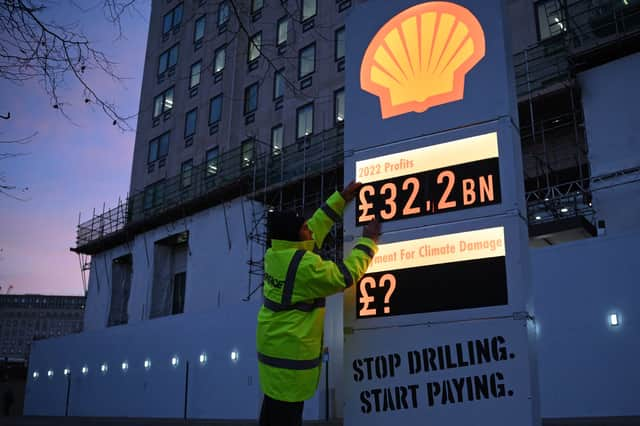Shell’s exorbitant profits - driven by the war in Ukraine - prove that a proper windfall tax is long overdue


On Thursday morning Shell posted core profits of £68 billion for 2022. It's a huge, almost unfathomable figure, and one that was difficult to comprehend for many people in the UK, currently grappling with the cost of living crisis. While inflation has been pushed sky-high by the war in Ukraine, the conflict has had a similar effect on the oil giant’s revenue.
It was a 53% increase on the previous year, and one of the biggest profits ever recorded by a UK company - while earnings adjusted for taxes also doubled to £32.2 billion. To put that into perspective, £32.2 billion is easily more than double the UK government’s annual environment budget (£13 billion), and almost on a par with the UK defence budget (£44.6 billion).
Advertisement
Hide AdAdvertisement
Hide AdAnd these riches were not amassed by business acumen, smart strategy or innovative investments. It was pure chance. Shell is benefiting from the same thing that’s hurting consumers and business owners everywhere: rising energy prices, caused by Russia’s invasion of Ukraine. It is, by definition, a windfall, predicated on a humanitarian catastrophe.
The line that government ministers have previously used against extending a windfall tax on energy firms is that global corporations like Shell only make a small proportion of their profits in the UK - in Shell’s case it’s about 5%.
But it’s a London-headquartered company, and these are not normal profits. They are vast, the highest in the company’s 115-year history - and they were made at the expense of the rest of us. It’s the public who paid for the lottery tickets, and it’s Shell’s board and shareholders who are holding on to the jackpot.
There’s also a precedent: as tax expert Dan Neidle writes, until 2009 the UK did tax foreign profits on companies, with a complicated tax credit system to stop anything being taxed twice. Yet despite these extraordinary circumstances, and the fact we’ve done it before, Rishi Sunak still refuses to countenance a higher windfall tax on energy companies.
Advertisement
Hide AdAdvertisement
Hide AdIn the aftermath of the Shell announcement, his spokesperson said that the Prime Minister “absolutely” understands people’s anger - coming as they do in the same week that The Times revealed that British Gas debt collectors are breaking into the homes of struggling customers to force-fit prepayment meters.
The government did introduce the Energy Profits Levy last year, but this doesn't go nearly far enough, because it allows companies to claim tax savings worth 91p of every £1 invested in fossil fuel extraction in the UK. As a result, Shell said this week that it's only paying £108 million tax on its 2022 earnings, after initially saying it would not have to pay a penny due to its investment in the North Sea.
If Sunak - who was himself called “stinking rich” this week in an awkward exchange with Piers Morgan (who is himself on a reported £50 million three-year deal with Rupert Murdoch’s News UK, let’s not forget) - really did understand the level of anger and desperation among people across the UK, who are suffering badly this winter, he would most certainly act on it.
Comment Guidelines
National World encourages reader discussion on our stories. User feedback, insights and back-and-forth exchanges add a rich layer of context to reporting. Please review our Community Guidelines before commenting.
